How Can We Fight Homegrown Terror?
After the Orlando attacks, the importance of domestic defenses is clearer than ever.
The Orlando shooting is unique only in the death toll it inflicted on American soil. Since the founding of the Islamic State in 2014, ISIS leaders have encouraged their followers to wage “lone wolf” attacks against targets in the United States–both civilian and military. ISIS-inspired self-starters followed suit with attacks in Chattanooga, Garland and San Bernardino. Well before today's killing, ISIS violence on the scale of the Orlando attack had become an all-too familiar scene in Europe and across the greater Middle East, where other Muslims bear the greatest brunt of this extremism.
The threat of Islamist terrorism will continue as long as the crisis of Islamic civilization remains unresolved. Globalization, refugee flows, and the spread of technology provide extremists with opportunities to spread their message and recruit supporters around the world. Alternatively, self-radicalized individuals may reach out to external groups such as ISIS for guidance and sense of belonging to an important and large group. The Orlando attack, insofar as it was homegrown yet influenced by terrorists abroad, may prove to be a harbinger of future attacks.
How should the United States confront this threat?
Internationally, the Orlando attacks call for an intensified offensive to roll back ISIS and other terrorist groups mobilizing against the United States. Washington is paying the price of its hasty withdrawal from Iraq and flawed policies in Syria, which fueled the rise of ISIS. The ability of ISIS to seize the vacuum and establish a de facto state has served as an inspiration for jihadists around the world.
Specifically, we need increased military cooperation among like-minded nations to:
· Reduce ungoverned spaces that breed terrorist sanctuaries.
· Create conditions that can facilitate balanced and durable settlements in the civil wars that are fueling Islamic extremism.
· Support moderate and secular forces who can prevail and govern in the Islamic world over the long-term.
· Isolate and confront the states and non-state entities that support, provide sanctuary for terrorists and extremists and use them as instrument of policy.
This is a generational effort, and will need to be pursued with prudence. State-building programs are necessary to help friendly forces take control of ungoverned areas. At the same time, large-scale, protracted military engagements in the Muslim world could backfire. The United States is the only power that can engage diplomatically with all sides and prevent any one power from becoming a regional hegemon until a sustainable balance of power is achieved in the Middle East region. We must take these steps without becoming ensnared in the Sunni-Shia sectarian struggle.
As we navigate the foreign policy challenge, we need to harden ourselves against the terror threat by reviewing our defenses at home. The main challenge is how to incentivize the Muslim community to police their communities and cooperate to a greater extent with law enforcement. Whatever the investigation reveals about Omar Mateen, the hard reality is that self-radicalization or the radicalism propagated by ISIS-type terrorists is resonating with a small but significant part of the Muslim community in the West including the United States.
The United States, particularly compared to its European counterparts, stands as a success story in the way it has integrated Muslim immigrants. While it is true that some Muslims are embracing extremism as they cope with the challenges of modernity, there is little question that the United States benefits, on balance, from the talents of Muslim immigrants who contribute to the American project. My own life experience is an example, but there are millions of others.
The question is how Muslim communities can do a better job of recognizing suspicious activities and identifying those who may be susceptible to jihadist influences. Secular and tolerant leaders in Muslim communities ultimately hold the key to marginalizing and defeating the extremists seeking to infiltrate Muslim communities in the United States.
In engaging Muslim communities, a salient dilemma is how to deal with Americans who are suspected of having ties with extremist and terrorist groups abroad or who are self-radicalizing. Are our policies, programs and capabilities equipped to monitor these activities? Are we doing enough, within the confines of the law, to act preventively or preemptively before “lone wolves” carry out attacks?
The challenge of Islamic terrorism defies any quick, short-term solutions. A comprehensive strategy is needed to address the root causes of the threat, which ultimately emanate abroad. But the Orlando attacks underscore that our domestic defenses are just as vital to preserve our freedoms.
Zalmay Khalilzad is a Counselor at CSIS. He was the US Ambassador in Afghanistan, Iraq and the UN. He is the author of a new book: The Envoy: From Kabul to the White House: My Journey through a Turbulent World. St Martin's Press.
Image: Man with gun. Meditations/pixabay. PD.

